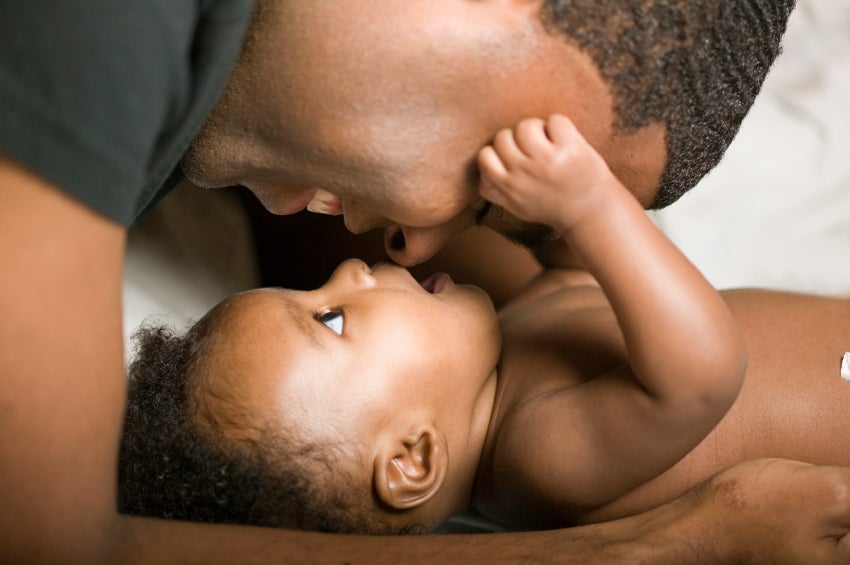By Jennifer Goldbronn
The 4- to 5-month-old baby is smiling and charming, attracting looks from passersby. His new game: purposely squealing or coughing just to get a reaction out of you. He is also conquering a myriad of new physical achievements, performing new feats almost on a daily basis. All of this excitement makes the average 4-month-old quite distracted. As we take a closer look at infant development in this age group, try to refrain from comparing your 4-month-old to your sister-in-law’s 4-month-old; every baby is unique as to when he will reach each developmental milestone!
Social Development
As your 4-month-old becomes more aware of her surroundings, she will become distracted by everyone (and everything) around her. This can make feeding rather challenging! I can remember trying to discreetly breastfeed my daughter in a restaurant when she suddenly craned her neck around to flirt with the waitress at the next table. Suddenly, I accidently flashed someone at the booth next to us. Embarrassing? Yes, but if I hadn’t known better at the time, I would have worried that she was rejecting my attempts to feed her. Luckily, I knew that she was only temporarily side-tracked. As she became able to focus at longer distances, exploring the world around her became more exciting than nursing. This didn’t last too long, but for a few weeks, we spent more of our time nursing in quiet rooms, free of distractions (and waitresses).
Cognitive Development
A baby’s sudden interest in the outside world is actually an important stage in his development. Let your baby explore and look around as much as possible. He has just discovered the law of cause (if I do this) and effect (that will happen). He will begin to use the same noises over and over in his attempts to get the same responses. He will love to play repetitive games and squeal with excitement whenever he finds he can predict your actions. Because he is so interested in his expanding world, you might find it easier to feed your baby in a quiet place, and keep baby’s sleep area free from distractions as well. Soon, baby will adjust to the extra stimulation and will focus back on Mom and the breast at feeding time.
Physical Development
Physical development is advancing at an amazing rate around 4-5 months. Babies are learning to sit with support and to use their hands to balance while sitting. They begin reaching and often are able to put objects in their mouths and transfer objects from one hand to the other. While counseling a mother of a baby who had just learned to reach for objects, I remember the mother exclaiming “Oh look! He’s reaching for his brother’s goldfish crackers! He must want some!” As I explained to her that her baby would practice reaching for ANY object, the baby demonstrated by quickly reaching for the board book I put in front of him.
Now is the time to expand tummy time! Tummy time is important for babies to develop strong back, arm and shoulder muscles for crawling. You can make this time more pleasant by getting on baby’s level to help engage his interest. Some babies this age might also roll over, but this happens at different ages for each child.
Growth Spurts
Four-month-olds often go through a growth spurt. Don’t be surprised if your baby wants to feed more often for a few days. A baby’s increased need for calories is important at this time for both physical and cognitive growth. If you are nursing, your body will automatically respond to these increased feedings by making more milk. Some breastfeeding mothers see this increased hunger or fussiness as a cue to start solid foods like cereal or to supplement with formula, but until a baby is 6-months old he needs nothing but his mother’s breast milk.
Sleep
For most families, there is a noticeable change in baby’s sleep around 4 months. Baby starts to fall asleep in quiet sleep and sleeps deeply for longer stretches. Many parents start to feel the fog of sleep deprivation lift a bit. However, off and on, all of the exciting things your baby is learning may disrupt his sleep. This is normal! Changes in routine, teething, illness, and overstimulation can increase night waking for a few days at a time throughout the first year. Be patient; this won’t last forever. You’ll get a LOT of advice about your baby’s sleep around this age. We find that most families find routines that work for them, eventually. Perhaps that’s a good topic for a future post.
